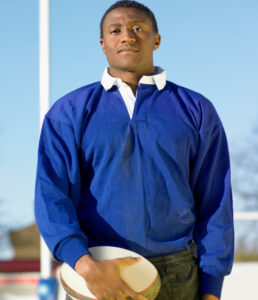In towns and suburbs scattered across KwaZulu-Natal, there are rugby fields that have seen the same faces year after year. Not on billboards or matchday programmes, but on the grass itself, men who have pulled on the same jersey every Saturday afternoon for twenty years or more. They are not chasing professional contracts or provincial glory. They are not looking for a ticket to Europe or Japan. These are the one-club men. Players who chose to stay. Men who have become part of their local team’s identity as much as the posts or the changing room walls.
At a glance, they might look like any other player, boots worn down from countless matches, thighs wrapped in strapping, eyes sharp even if the pace has slowed. But in places like Pinetown, Empangeni, or the smaller suburbs on Durban’s outskirts, these players carry quiet status. Not because they ever made it onto a Springboks shortlist, but because they never left when so many others did.
Among local supporters, these names are repeated with a kind of respect usually reserved for legends. Not everyone can recall their first match, but everyone knows they’re still there. The prop who first pulled on a jersey in 2003 and still shows up for training. The flanker who teaches at the local school by day but still hits every ruck with the same intent as he did in his twenties. Their value isn’t in stats. It’s in presence, in loyalty, in the way they become anchors in teams where younger players cycle in and out, always looking for something bigger.
In KZN rugby, this kind of player holds a special place. The province has produced big names, players who moved on to Sharks contracts and Springbok tours. But beneath that, the club system relies on these steady, long-term presences to keep things grounded. They are the ones showing up early to open the changerooms. The ones organising Friday night socials or standing behind the braai after a match, chatting about nothing in particular while the younger guys count up their tackles and plan their next step up the ladder.
There is no glamour in staying. One-club men play in front of small crowds. Sometimes just family members, girlfriends, a couple of mates with beers on the sideline. But that doesn’t seem to change the weight they carry. It’s something quieter than fame, recognition earned over time. Every tackle, every try scored or saved, woven into the fabric of the club.
What makes it more striking is how often these men turned down opportunities. There are always stories floating around. A player from Amanzimtoti offered a contract in Gauteng but choosing to stay because of family, work, or simply a sense that home mattered more. Another in Maritzburg who could have joined a bigger club but didn’t want to leave the team that first gave him a jersey as a schoolboy.
 For many of them, rugby fits around life rather than the other way around. They work as teachers, mechanics, salesmen, builders. Jobs that pay the bills while Saturday afternoons are reserved for something else entirely. At training, they might not be the fastest anymore. But watch closely, and you’ll see how every drill changes slightly when they’re there, how the younger players watch what they do, adjust their pace to match, try to mirror the effort.
For many of them, rugby fits around life rather than the other way around. They work as teachers, mechanics, salesmen, builders. Jobs that pay the bills while Saturday afternoons are reserved for something else entirely. At training, they might not be the fastest anymore. But watch closely, and you’ll see how every drill changes slightly when they’re there, how the younger players watch what they do, adjust their pace to match, try to mirror the effort.
It’s not unusual for a one-club man to step in as coach while still pulling on the boots himself. Sometimes officially, sometimes just by quiet example. Explaining to a younger player how to handle a certain line-out, or how to keep calm when things start getting heated on the field. That’s the thing about players like this, they understand the rhythm of the game not just as a contest, but as something longer, something bigger than one season or one trophy.
In a world where rugby is increasingly shaped by sponsorships, televised matches, and structured academies, this layer of the sport feels almost like another time entirely. But it’s still there. Alive in places like the back fields of Bluff, where floodlights flicker to life in the early evening and jerseys are washed and hung up in the same changerooms where those same players once sat as teenagers.
When asked why they stayed, most of these men will shrug. There’s no big speech about loyalty or tradition. It’s simpler than that. The club feels like home. The field feels familiar. The same faces around you, year after year, season after season. For them, it isn’t about what could have been. It’s about what is. What remains.
When retirement does come, it’s not marked by a press release or a farewell match in front of thousands. More often, it happens quietly. A man who’s been there for twenty years simply stops pulling on the jersey. Maybe his knees finally gave out. Maybe work or family pulled him away. But even then, his presence lingers. At club functions, at post-match gatherings, his name will still come up. Remember when he held that line? Remember that try he scored against the bigger club down the road?
In a place like KwaZulu-Natal, where rugby ties into both cultural identity and community history, these stories matter. They are stitched into the same fabric as the club colours, the faded murals on the clubhouse wall, the old trophies gathering dust on a back shelf. One-club men may not make the headlines, but they give shape to everything else the sport stands on.
Their legacy isn’t measured in caps or contract numbers. It’s measured in Saturday afternoons spent in the same jersey, running the same field, carrying the same weight not just for themselves but for everyone around them. And in the quiet way they step aside when the time is right, leaving space for the next player to pull on that jersey for the first time, not yet knowing just how long they might stay.




